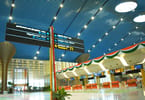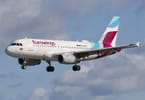American Airlines said Wednesday that it has the the money to take delivery of all 84 of its Boeing 737 orders through 2011. Previously, American had said it only had financing commitments to cover 737 orders into the second half of 2010.
American says it needs its new Boeing 737-800s because they have a “favorable impact on the environment,” and more importantly to the bottom line, they are more fuel efficent. “The new 737-800 burns about 35 percent less fuel per seat-mile than the MD-80 it is replacing, an average savings of 800,000 gallons of fuel per aircraft per year,” American said.
American raised $520 million in public debt in the second quarter. That money, combined with “previous” financing commitments, give American the ability to buy the aircraft through 2011, the company explained.
American also raised $66 million in cash in the second quarter from a sale-leaseback transaction involving some aircraft it owns.
“One of the important highlights of the second quarter was the deployment of the first wave of new 737s we will receive in the next two years,” said Gerard Arpey, CEO of AMR Corp., the parent company of American Airlines, in a memo to employees. “In addition to new planes, we are continuing to prudently invest to refurbish our aircraft interiors and airport facilities in a variety of ways.”
The company reported a second quarter loss of $390 million on Wednesday.
Excluding a one-time charge of $70 million related to the sale of certain aircraft and grounding of leased Airbus A300 aircraft prior to lease expiration, American reported a loss of $319 million, or $1.14 per share. Wall Street analysts had expected a loss of $1.28 per share.
Following is Arpey’s full memo to employees:
American Airlines
Gerard J. Arpey
Chairman and Chief Executive Officer
July 15, 2009
Dear Colleague:
Given the global recession and the sharpest decline in air travel since the aftermath of 9/11, I’m sure it comes as no surprise to you that we lost money in the second quarter of 2009. To be exact, in the three months ending June 30th, we lost $319 million, which compares to a $298 million loss during the same period in 2008, excluding special items. As you know, a year ago we were moving aggressively to confront the problem of skyrocketing fuel costs. At the time I said that the airline industry was not built for $130 a barrel oil. That’s still true, but today I must add that neither is the industry built for today’s environment of negative global economic growth and erratic capital markets.
The global recession kept a lot of would-be travelers at home in the second quarter, as evidenced by our 23 percent passenger revenue decline. While we have been able to keep our planes reasonably full, the competitive landscape prevented us from being able to charge fares sufficient for us to make money. Compounding this, business travel has been hit especially hard by the weak economy. In fact, AA’s second quarter yield, which represents average fares, fell by 15 percent compared to 2008. Making matters worse was the significant decline in revenue we experienced as a result of the H1N1 flu outbreak.
If someone predicted oil prices would be cut in half from nearly $150 a barrel a year ago, yet the airline industry would be in worse shape, not many people would have believed it — but that seems to be exactly what has happened. And no carrier is immune — whether low-cost, legacy or foreign, because we are all dependent on the health of the economies we serve.
In this extraordinary economic environment, it’s important that we continue to focus our efforts on the things we can control. For all of us, that means continuing to execute when it comes to delivering the basics of airline service — and we should all be encouraged by the fact that across a broad range of service categories we have been doing a good job in recent months.
Compared to 2008, our completion factor, on-time performance, and baggage handling statistics are all improved — and not surprisingly, so are our customer satisfaction scores. With the slump in air travel demand making competition for every customer that much more intense, our focus on customer service has never been more important. And we all need to do our part to sustain and build on our current momentum.
As challenging as things are today, our task would be far more daunting had we not met so many challenges head on during the last several years. Moreover, I want to stress once again that our objective is not to simply endure the latest crisis. It is to make sure our airline is positioned to compete and win over the long haul. That’s what our fleet renewal program is all about, and one of the important highlights of the second quarter was the deployment of the first wave of new 737s we will receive in the next two years. In addition to new planes, we are continuing to prudently invest to refurbish our aircraft interiors and airport facilities in a variety of ways.
Without diminishing the magnitude of what we — along with every other airline — are up against today, we believe we are taking the right steps. We have a long list of competitive strengths, proven resilience, and despite formidable obstacles, we are executing well on a number of fronts. We are running an airline our customers can depend on, delivering the products and services they value, and building a fleet and a network that will serve our customers, our people, and our company well for many years to come.
I want to conclude, as always, by thanking you for your hard work and commitment to American Airlines.
Sincerely yours,
(Gerard Arpey, signature)
WHAT TO TAKE AWAY FROM THIS ARTICLE:
- Given the global recession and the sharpest decline in air travel since the aftermath of 9/11, I’m sure it comes as no surprise to you that we lost money in the second quarter of 2009.
- Excluding a one-time charge of $70 million related to the sale of certain aircraft and grounding of leased Airbus A300 aircraft prior to lease expiration, American reported a loss of $319 million, or $1.
- “One of the important highlights of the second quarter was the deployment of the first wave of new 737s we will receive in the next two years,”.






















